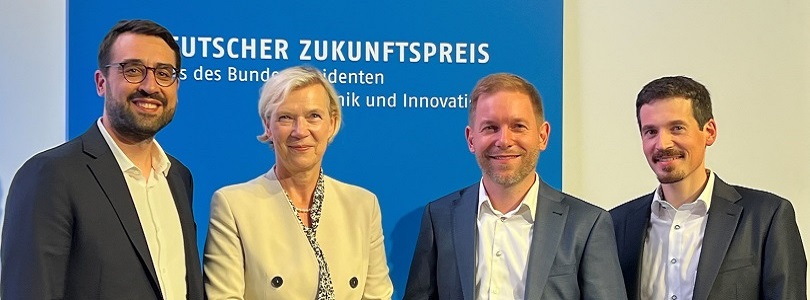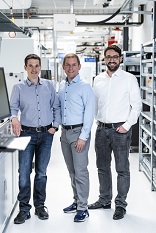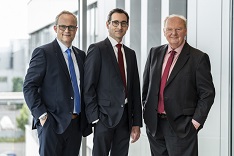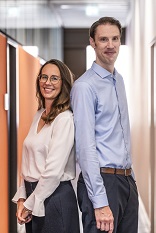Content
Energy-efficient semiconductors, digital light and generative AI for new business models

President of the German Patent and Trade Mark Office (DPMA) recognises the three teams nominated for the Federal President’s Deutscher Zukunftspreis – DPMA proposal among the finalists
Press release of 11 September 2024
A new, highly energy-efficient semiconductor module, a method for digital light generation and a freely available generative artificial intelligence system that allows everybody to pursue new business models: These three innovations and the teams behind them are this year’s nominees for the Federal President’s Deutscher Zukunftspreis. One of the innovations was proposed by the DPMA: The new power semiconductor module by Infineon Technologies AG and TU Chemnitz promises a leap forward in efficiency in areas in which large quantities of power must be controlled in next to no time. “We are very pleased that the jury of the Federal President’s Award for Technology and Innovation once again selected one of our proposals for the final round,” DPMA President Eva Schewior said. She added: “The innovative semiconductor module could enable a technological leap in energy supply in many areas. Such a surge in innovations strengthens our business location and helps us achieve our goals with regard to energy efficiency and climate protection.” The DPMA President recognised the excellence of the nominated innovations: “This year in particular, the Deutscher Zukunftspreis proves to be a beacon in tough economic times. The broad range and the high quality of the nominated innovations show that Germany is still a highly productive place of innovation.”

from left: Prof. Dr.-Ing. Thomas Basler, Dr. Konrad Schraml and Dr. Caspar Leendertz
The semiconductor module developed by Dr Konrad Schraml, Dr Caspar Leendertz (Infineon Technologies AG) and Prof Thomas Basler (TU Chemnitz) combines several improvements compared to conventional modules. Unlike regular modules, the transistors are not made of silicon but of silicon carbide, which is significantly more rupture resistant and energy-efficient. In addition, the transistors have an integrated diode and a robust copper contact. Compared to its predecessors, the new power semiconductor module suffers 90% fewer switching losses, handles ten times more power, is ten times more resistant to thermomechanical strain and needs 50% less chip surface. It is meant to allow applications of up to 3,300 V. For example, it would be possible to change switching elements for trains from the currently standard water cooling technology to airstream cooling. Applications in other areas, e.g. solar energy, wind power, agricultural and construction machines and, in the far future, air transportation, are intended too.

from left: Stefan Grötsch, Dr. Norwin von Malm and Dr.-Ing. Hermann Oppermann
The following are the other nominated teams:
Dr Norwin von Malm, Stefan Groetsch (ams-OSRAM International GmbH) and Dr Hermann Oppermann (Fraunhofer IZM) have developed a new technology that allows tiny LED pixels to be individually operated and thus enables new, resource-efficient applications. The team calls its innovation “digital light”. One example of use of this innovation is a headlight that intelligently and adaptively distributes light on the road surface, providing greater driving safety. With an elaborate light sensor system, additional applications might be in the field of augmented reality and human and machine interaction.

Dr.-Ing. Anna Lukasson-Herzog and Dr. Björn Ommer
Prof Björn Ommer (Ludwig-Maximilians-Universität München) and Dr Anna Lukasson-Herzig (Nyris GmbH) are nominated with their project “Democratisation of generative AI – Stable Diffusion from development to practice”. With Stable Diffusion, Prof Ommer’s team has developed a compact and efficient generative AI system that is freely available and can be applied in countless ways, especially by start-ups. Nyris GmbH used Stable Diffusion to develop a system that can very quickly identify machine parts on the basis of pictures. Where technical installations are not working, defective components can be identified and replaced quickly. The innovation thus shows one possibility to make generative AI usable to industrial facilities in Germany and worldwide.
The Deutscher Zukunftspreis – the Federal President’s Award for Technology and Innovation – comes with prize money of 250,000 euros. On November 27th, the jury will decide who wins the award. The award ceremony with the Federal President in Berlin will be livestreamed at zdf.de and at deutscher-zukunftspreis.de. A taping will be broadcast starting at 22:15 on German TV channel ZDF.
The German Patent and Trade Mark Office
Inventiveness and creativity need effective protection. The DPMA is the German centre of expertise for all intellectual property rights – patents, utility models, trade marks and designs. As the largest national patent office in Europe and the fifth largest national patent office in the world, our office stands for the future of Germany as a country of inventors in a globalised economy. Its staff of just under 2,800 at three locations – Munich, Jena and Berlin – provide services to inventors and companies. They implement federal innovation strategies and develop the national, European and international protection systems.
Bilder: DPMA, Deutscher Zukunftspreis/ Ansgar Pudenz
Last updated: 11 September 2024

Not only protecting innovations
Social Media